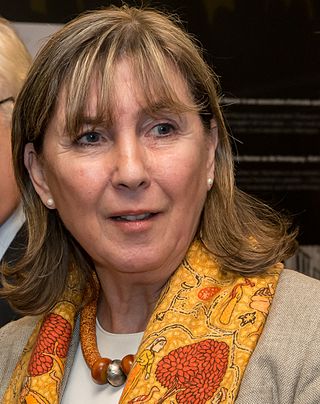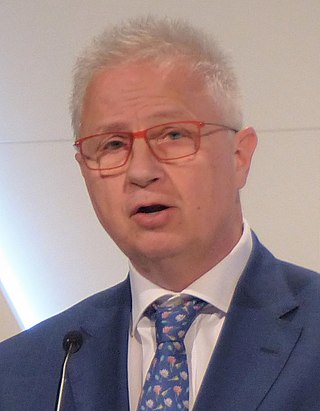
The history of Luxembourg consists of the history of the country of Luxembourg and its geographical area.
Luxembourg is a parliamentary representative democratic monarchy, whereby the prime minister is the head of government, and the multi-party system. Executive power is under the constitution of 1868, as amended, exercised by the government, by the grand duke and the Council of Government (cabinet), which consists of a prime minister and several other ministers. Usually, the prime minister is the leader of the political party or coalition of parties having the most seats in parliament. Legislative power is vested in both the government and parliament. The judiciary is independent of the executive and the legislature.

Jean-Claude Juncker is a Luxembourgish politician who served as the 21st prime minister of Luxembourg from 1995 to 2013 and 12th president of the European Commission from 2014 to 2019. He also served as Finance Minister from 1989 to 2009 and President of the Eurogroup from 2005 to 2013.

The Christian Social People's Party, abbreviated to CSV or PCS, is the largest political party in Luxembourg. The party follows a Christian-democratic and conservative ideology and, like most parties in Luxembourg, is strongly pro-European. The CSV is a member of the European People's Party (EPP) and the Centrist Democrat International (CDI).

The Luxembourg Socialist Workers' Party, abbreviated to LSAP or POSL, is a social-democratic, pro-European political party in Luxembourg. The LSAP sits on the centre-left of the political spectrum.

Jacques François Poos was a Luxembourgish politician.

Pierre Moscovici is a French politician who served as the European Commissioner for Economic and Financial Affairs, Taxation and Customs from 2014 to 2019. He previously served as Minister of Finance from 2012 to 2014 and as Minister for European Affairs between 1997 and 2002.

Lydie Polfer is a Luxembourgish politician who has served in a number of capacities, including Deputy Prime Minister, Minister for Foreign Affairs, and Mayor of Luxembourg City, as well as a Member of the European Parliament (MEP) and a member of the Chamber of Deputies. She is a member of the Democratic Party (DP).

Margrethe Vestager is a Danish politician currently serving as Executive Vice President of the European Commission for A Europe Fit for the Digital Age since December 2019 and European Commissioner for Competition since 2014. Vestager is a member of the Danish Social Liberal Party, and of the Alliance of Liberals and Democrats for Europe Party (ALDE) on the European level.

Jean Asselborn is a Luxembourgish politician who has served in the government of Luxembourg as Minister for Foreign Affairs since 2004. He also served as Deputy Prime Minister from 2004 to 2013, under Prime Minister Jean-Claude Juncker.

The first Juncker–Asselborn Ministry was the government of Luxembourg between 31 July 2004 and 23 July 2009. It was led by, and named after, Prime Minister Jean-Claude Juncker and Deputy Prime Minister Jean Asselborn.

The Juncker–Poos Ministry was the government of Luxembourg between 26 January 1995 and 7 August 1999. It was led by, and named after, Prime Minister Jean-Claude Juncker and Deputy Prime Minister Jacques Poos.
General elections were held in Luxembourg on 7 June 2009, together with the 2009 election to the European Parliament. All sixty members of the Chamber of Deputies were elected for five years. The polls were topped by the Christian Social People's Party, which built upon its already high number of seats to achieve a commanding victory, with the highest vote share and number of seats of any party since 1954. Incumbent Prime Minister Jean-Claude Juncker, who is longest serving head of government in the European Union, renewed the coalition agreement with Deputy Prime Minister and Luxembourg Socialist Workers' Party leader Jean Asselborn and formed the Juncker-Asselborn Ministry II, which was sworn-in on 23 July 2009.

The Eurogroup is the recognised collective term for the informal meetings of the finance ministers of the eurozone—those member states of the European Union (EU) which have adopted the euro as their official currency. The group has 20 members. It exercises political control over the currency and related aspects of the EU's monetary union such as the Stability and Growth Pact. The current President of the Eurogroup is Paschal Donohoe, the Minister for Public Expenditure, National Development Plan Delivery and Reform of Ireland.

Juncker–Asselborn Ministry II was the government of Luxembourg between 23 July 2009 and 11 July 2013. It was led by, and named after, Prime Minister Jean-Claude Juncker and Deputy Prime Minister Jean Asselborn. It was formed on 23 July 2009, after the 2009 election to the Chamber of Deputies. It fell after the withdrawal of the Luxembourg Socialist Workers' Party from the government; Prime Minister Juncker submitted his resignation to the Grand Duke on 11 July 2013, and a snap election was called.

Early general elections were held in Luxembourg on 20 October 2013. The elections were called after Prime Minister Jean-Claude Juncker, at the time the longest-serving head of government in the European Union, announced his resignation over a spy scandal involving the Service de Renseignement de l'État (SREL). The review found Juncker deficient in his control over the service.

The First Bettel–Schneider Ministry was the ruling government of Luxembourg from 4 December 2013 to 5 December 2018. It was led by Prime Minister Xavier Bettel and Deputy Prime Minister Etienne Schneider. It was formed on 4 December 2013, after the 2013 election which saw all 60 seats in the Chamber of Deputies renewed. The government was a traffic light coalition between the Democratic Party (DP), the Luxembourg Socialist Workers' Party (LSAP) and The Greens. It was succeeded by Bettel–Schneider Ministry II on 5 December 2018.

2014 European Parliament elections were held in Slovenia on 25 May 2014. It was the first in the series of three elections held in the 2014, and the major test leading up to the parliamentary elections in July. The political atmosphere was in a crisis that started with the fall of Borut Pahor's government, then Janez Janša's government in 2013, the latter coming after Janša was accused of corruption. The cabinet of Alenka Bratušek was breaking up, as the former leader of the Positive Slovenia Zoran Janković, who was under the suspicion of corruption, announced his candidature for party president, even though the coalition parties threatened to leave the government if he was to be elected, which later he was.
Events in the year 2014 in the European Union.

An election of Members of the European Parliament from Hungary to the European Parliament was held on 26 May 2019, electing the 21 members of the Hungary delegation to the European Parliament as part of the European elections held across the European Union.















